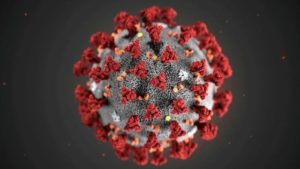The new coronavirus (Covid-19) has spread to nearly every country in the world since it first emerged in China at the beginning of the year. More than 4.1 million people are known to be infected across the world and more than 285,000 deaths have been recorded – including 32,065 in the UK (12.05.2020).
Click the link: Top tips for working from home during the lockdown – but read on to discover more about this pesky virus.
What is a coronavirus?
Coronaviruses are a family of viruses that cause disease in animals. Seven, including the new virus, have made the jump to humans, but most just cause cold-like symptoms.
Covid-19 is closely related to severe acute respiratory syndrome (SARS) which swept around the world in 2002 to 2003. That virus infected around 8,000 people and killed about 800 but it soon ran itself out, largely because most of those infected were seriously ill so it was easier to control.
Another coronavirus is Middle East respiratory syndrome (MERS), cases of which have been occurring sporadically since it first emerged in 2012 – there have been around 2,500 cases and nearly 900 deaths.
Covid-19 is different to these two other coronaviruses in that the spectrum of disease is broad, with around 80 per cent of cases leading to a mild infection. There may also be many people carrying the disease and displaying no symptoms, making it even harder to control.
So far, around 20 per cent of Covid-19 cases have been classed as “severe” and the current death rate varies between 0.7 per cent and 3.4 per cent depending on the location and, crucially, access to good hospital care.
Scientists in China believe that Covid-19 has mutated into two strains, one more aggressive than the other, which could make developing a vaccine more complicated.
How did the outbreak start?
The source of the coronavirus is believed to be a “wet market” in Wuhan which sold both dead and live animals including fish and birds.
Such markets pose a heightened risk of viruses jumping from animals to humans because hygiene standards are difficult to maintain if live animals are being kept and butchered on site. Typically, they are also densely packed allowing disease to spread from species to species.
The animal source of Covid-19 has not yet been identified, but the original host is thought to be bats. Bats were not sold at the Wuhan market but may have infected live chickens or other animals sold there.
Bats are host to a wide range of zoonotic viruses including Ebola, HIV and rabies.
How big could the pandemic get?
The disease has already taken hold in Europe, the United States and South East Asia and is beginning to wreak havoc in Africa and South America. The World Health Organization is particularly concerned at the ability of the poorest countries in the world to control the disease.
What are the symptoms of coronavirus?
Initial symptoms include fever, dry cough, tiredness and a general feeling of being unwell. Other symptoms are emerging such as a loss of taste and smell and stomach problems.
Is coronavirus in the UK?
55,242 people in the UK have tested positive for the virus so far.
An elderly person with underlying health issues became the first person in Britain to die having been diagnosed with the disease, Royal Berkshire NHS Trust confirmed on March 5. Since then, a total of 6,159 people have died.
Is there a cure for the coronavirus?
There is no specific treatment, although doctors are trialling existing drugs for viruses such as Ebola, malaria and HIV. Early results seem promising but, until full clinical trials have been concluded, doctors cannot be certain that the drugs are effective.
Work to develop a vaccine is accelerating but it is unlikely to be available until next year.
How is coronavirus spread?
Like cold and flu bugs, the virus is spread via droplets when a person coughs or sneezes. The droplets land on surfaces and are picked up on the hands of others and spread further. People catch the virus when they touch their infected hands to their mouth, nose or eyes.
It follows that the single most important thing you can do to protect yourself is keep your hands clean by washing them frequently with soap and water or a hand sanitising gel.
Is the coronavirus airborne?
There is some debate about whether the disease is airborne – there is no evidence for it yet, but that could change. Airborne viruses linger for a longer period of time than those spread by droplets and can also be spread in air conditioning and ventilation systems.
The current advice is that the disease can only be spread between close contacts – defined as spending more than 15 minutes within two metres of an infected person.
Who started the coronavirus?
Various crazy conspiracy theories have been circulating that the virus somehow escaped from a Chinese lab, either by accident or design. However, this is categorically untrue and scientists studying its genetic code have linked it to bats. It probably then jumped to another animal, which passed it on to humans.
The number of diseases crossing from animals to humans is growing, and teams of virus hunters are tracking them down.
